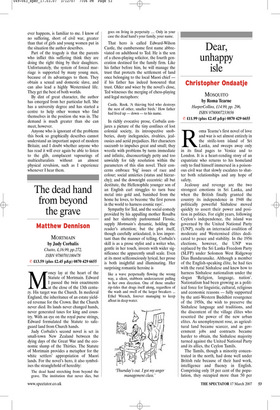The dead hand from beyond the grave
Matthew Dennison
MORTMAIN by Judy Corbalis Chatto, £,16.99, pp.272, ISBN 9780701180478 ✆ £13.59 (plus £2.45 p&p) 0870 429 6655 Money lay at the heart of the Statute of Mortmain. Edward I passed the twin enactments at the close of the 13th century. His target was the Church. In medieval England, the inheritance of an estate yielded revenue for the Crown. But the Church never died. Its lands never changed hands, never generated taxes for king and country. With an eye on the royal purse strings, Edward formulated the Statute to safeguard land from Church hands.
Judy Corbalis’s second novel is set in small-town New Zealand between the dying days of the Great War and the economic slump of the Thirties. The Statute of Mortmain provides a metaphor for the white settlers’ appropriation of Maori lands. For the novel’s hero, it also symbolises the stranglehold of heredity:
The dead hand stretching from beyond the grave. The institution that never dies, but goes on living in perpetuity ... Only in your case the dead hand’s your family, your name.
That hero is called Edward-Wilson Castle, the cumbersome first name abbreviated on adulthood to Ted. He is the son of a chess-playing solicitor, the fourth generation destined for the family firm. Like his father before him, he will manage the trust that protects the settlement of land once belonging to the local Maori chief if his father has indeed honoured that trust. Older and wiser by the novel’s close, Ted witnesses the merging of chess-playing and legal metaphors:
Castle. Rook. ‘A thieving bird who destroys the nest of other, smaller birds.’ How father had lived up — down — to his name.
In richly evocative prose, Corbalis conjures a picture of the tiny confines of lost colonial society, its introspective snobberies, dusty inelegancies, rivalries, jealousies and acrid prejudices. Her characters succumb to impulses great and small; they wrestle with problems by turns immediate and infinite, disconcertingly petty and too unwieldy for tidy resolution within the parameters of this slim novel. Their concerns embrace ‘big’ issues of race and colour; social anxieties (status and hierarchy); and the downright eccentric: all but destitute, the Hellenophile younger son of an English earl struggles to turn base metal into gold and, banished from the home he loves, to become ‘the first person in the world to harness cosmic rays’.
Sympathy for Ted, and the social comedy provided by his appalling mother Rosalba and her slatternly parlourmaid Flossie, supply Mortmain’s dynamic, holding the reader’s attention; but the plot itself, though carefully articulated, is less important than the manner of telling. Corbalis’s skill is as a prose stylist and a writer who, gentle in her touch, invests with wider significance the apparently small scale. Even at its most selfconsciously lyrical, her prose is both insightful and illuminating. Her surprising romantic heroine is
like a wave perpetually flowing the wrong way, a silent, stubborn undercurrent pulling in her own direction. One of those smaller rip-tides that drags itself along, regardless of the wash and swell of the larger breakers ... Ethel Wrench, forever managing to keep afloat in deep water.


































































































 Previous page
Previous page